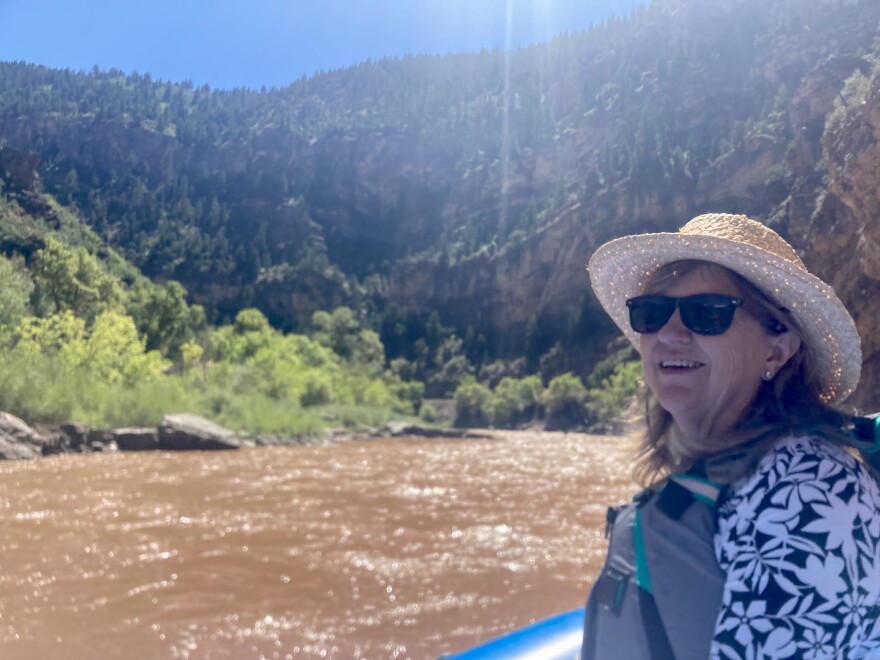Protesters are celebrating a win in the fight against the Uinta Basin Railway and preparing for what’s to come after the project experienced a major setback last week.
On Aug. 18, a federal judge ruled the project’s environmental impact statement (EIS) was not comprehensive enough and sent the Surface Transportation Board, which conducted the assessment, back to the drawing board.
But environmentalists are still worried about the types of disasters that could result from the railway.
If built, it would connect oil fields in northeast Utah to existing rail lines, including the Union Pacific Line, which runs along the Colorado River through Glenwood Canyon. And it could bring up to 185,000 rail cars full of crude oil through Glenwood Canyon every year, according to a lawsuit filed by Eagle County and the Center for Biological Diversity.
According to the EIS, the new railroad could more than double the current risk of an accident on the Union Pacific Line between Kyune, Utah and Denver, CO where a railcar could derail, spill oil into the river, or catch fire.
So on Aug. 26, the nonprofits 350 Roaring Fork and Colorado Rising organized environmental advocates, boaters, and politicians to raft en masse through Glenwood Canyon and raise awareness about how an oil spill could decimate the health of the Colorado river.

Differing Opinions
Utah’s Seven County Infrastructure Coalition is one of the partner organizations that proposed the railroad. They say it’s a safer and more reliable method of transportation than using trucks on two-lane highways, according to promotional materials on the Uinta Basin Railway’s website.
But Colorado Democratic State Sen. Lisa Cutter, who participated in Saturday’s flotilla, disagrees.
“Why do we continue to ship and to make it OK to transport this substance that we're trying to get away from anyway?” Cutter asked. “Why are we making it easier?”
She questioned the values that motivated project managers to design the project.
“They're talking about income and jobs, and all those things are important,” Cutter said. “But … why do we define ourselves only by that measure?”
Cutter isn’t alone.
Gregory Cowan and his wife Heather Montross-Cowan bought Defiance Rafting Company about six years ago.
And since then, there’s been a 30,000-acre fire and massive mudslides that shut down access to the river during peak season for weeks at a time, multiple summers in a row.
But Cowan said those disasters felt out of his control, while the Uinta Basin Railway does not.
“We can come in and say, ‘No, we do not wish to introduce this level of risk and potential harm into our community,’” Cowan said.

Delayed, but not dead
When a federal judge ruled the railway’s EIS violated the National Environmental Policy Act (NEPA) on Aug. 18, it sent project management teams back to square one.
The judge made the decision in part because the assessment did not consider the “downline” impacts of all that new oil traveling south to refineries in Texas and Louisiana.
A lot of that oil would travel along the Union Pacific Line, which hugs the Colorado River in Western Colorado. A spill would contaminate drinking water for thousands and devastate the local economy.
Defiance Rafting Company co-owner Heather Montross-Cowan says that if there was a spill during peak season, it would shut them down completely. “When your season’s three months long, to lose half [or] all of it is a huge impact,” Montross-Cowan said. “You can't recover from that.”
Most of Glenwood Springs’ tourism industry relies on the river in some way — from rafting companies and hot springs to hotels and restaurants overlooking the water.
But for Cowan, the job is a lot more than a paycheck.
“It's my favorite place,” Cowan said. “It's where I can go and just shut everything off and it's just me and whoever is in the raft with me and the river.”
Montross-Cowan said before owning Defiance, she wouldn’t have considered herself an environmentalist, but the river has changed her perspective.
“I've seen the impacts of changing weather patterns, more extremes,” Montross-Cowan said. “What has once been a very predictable stretch of river is not … And now we're standing here, and it's a very different place to be.”
The flotilla arrived at Two Rivers Park around 1:30 p.m. where a small crowd celebrated the ruling with a concert, but advocates know that the project isn’t dead yet.
On Facebook, officials pushing for the project said they remain committed to the railway, which could result in an appeal of Judge Wilkins’ ruling or another, more comprehensive EIS.
In the meantime, Montross-Cowan and her husband continue to send rafters down this section of the river without knowing what the future holds.
Whatever becomes of the project, they’re happy that the cause has brought out a mix of river enthusiasts.
“Oil and water don't mix,” Montross-Cowan said.
“Yeah, but they do bring us together,” Cowan said.




